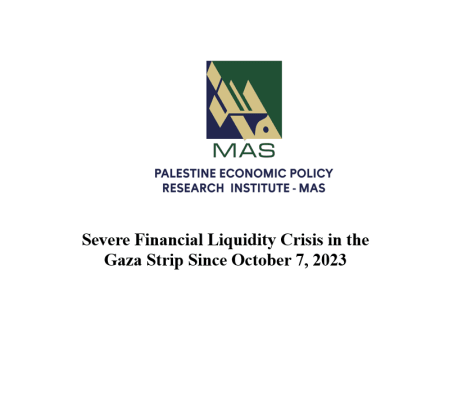Severe Financial Liquidity Crisis in the Gaza Strip Since October 7, 2023
The Gaza Strip is facing an unprecedented financial liquidity crisis following the Israeli military aggression that began on October 7, 2023. The war has devastated Gaza’s economy, leading to an 82% drop in GDP, massive job losses, and an unemployment rate exceeding 80%. The destruction of banking infrastructure, including the shutdown of all ATMs and bank branches, has left Gaza cut off from cash inflows. Israeli-imposed restrictions on currency entry, coupled with the looting of an estimated $234 million from financial institutions, have exacerbated the crisis. The resulting cash shortages have led to the rise of black-market currency exchanges (Mukayyeesheen), hyperinflation, and a dramatic decline in purchasing power, pushing Gaza’s population into deeper economic distress.
This paper explores the key drivers of the liquidity shortage and the measures adopted by the Palestinian Monetary Authority (PMA) to mitigate such a crisis, including launching real-time digital payment systems, promoting e-wallet adoption, and ensuring financial sector resilience. Though, structural challenges such as weak digital infrastructure, limited internet access, and social barriers to digital transactions hinder the effectiveness of these initiatives. This paper highlights the urgent need for coordinated interventions, including advocacy for cash entry, the regulation of financial markets, and the establishment of centralized commercial centers to prevent exploitation. Expanding digital literacy programs and incentivizing businesses to transition to electronic payments through initiatives like the ESTIDAMA Plus program are also crucial to enhancing financial inclusion.
In conclusion, the paper outlines potential solutions to mitigate the crisis, including policy recommendations that can help alleviate cash shortages, improving banking mechanisms, and strengthening collaboration between the PMA, private sector stakeholders, and international organizations is essential for rebuilding Gaza’s financial ecosystem."

